On Wednesday I sat in on a meeting that took place in Aldeia 3; the most recently completed and occupied village in the project. Eran got a call the night before from Delegado, the central co-ordinator of aldeia 1, to say that an old woman and a younger woman carrying two babies and not much else had just arrived in the village from Gabela – a 5-6 hour journey by bus – looking for the old woman’s husband who is one of the new villagers in aldeia 3. According to these women this man left her house one day, without taking any of his things with him, collected his namorada (lover) and moved to Wako-Cungo to the house in the project he’d been promised, leaving his entire family behind!
Ok, maybe there needs to be some context to how this project is supposed to be working: when the civil war ended in 2002 with the MPLA side (who during the war were armed and fuelled by the Russians against the South Africans and Americans, until the very end when it was clearer that this would be the political party that would come out on top, at which point America switched sides and now supports MPLA) installed in government, the country had at that point been in a constant state of war for around 30 years. Most people had grown up through it knowing nothing different. Infrastructure had been almost entirely obliterated: no landline telephones, complete roads or bridges. There is still no organised internal postal service and absolutely no kind of international postal service (even though there are pillar-red post boxes in every town!). The government still had a divided country of Unita and MPLA supporters, and it also now had an operative democratic system that would from now on depend upon votes (and not war) to stay in power. With such an almost equal political divide, it was in its interests to win over the Unita supporters. Hence the government funding of such projects as this one: combining the country’s need to be agriculturally self-sufficient, keep migration to the massively over-populated capital Luanda down, rebuild its basic infrastructure and, crucially – at least for this project – reintegrate the ex-combatants of the two political sides. 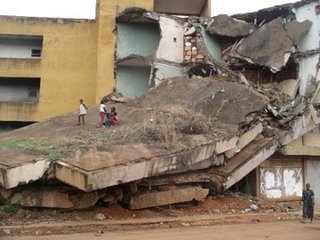
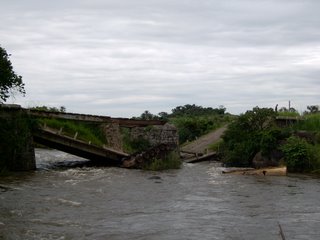
Aldeia Nova is using the very sound structure of the old Portuguese agricultural systems, and the frames and shells of the old Portuguese houses, all left behind when the last of the colonisers were gone in the 70s, to decay or be blown apart during the proceeding years of war, to rebuild pockets of the country. Each village surrounding Wako-Cungo has had its old houses renovated and new houses, in the same style, constructed around them. All the houses already occupied before the project were returned to their owners after renovation. But all the new houses are being filled with families of ex-combatants from all over the province of Kwanza-Sul. On a surface level social relations between everyone seem to be going well, but there is nothing simple about this solution, since the ex-combatants on both sides murdered many people, and only time will tell how stable these new relations are. Each aldeia has at least one co-ordinator – trained by the project (the same people I taught English to last time I was here) – also from both parties – and also the highest ranked in terms of their ex-military experiences – some of them gave the word, and participated in, the largest scale massacres in the war – who will be left more or less in charge when the Israeli intervention in the project withdraws. 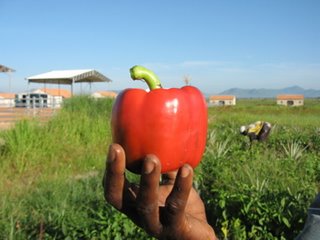
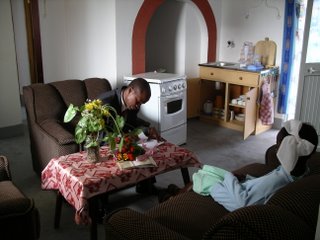
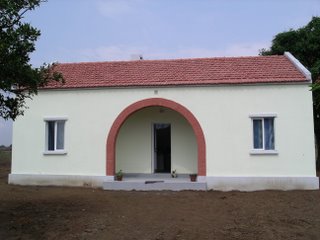
The project is using ‘the family unit’ as the source for a unified – at least in terms of intention – strength that people will draw on and have as a base to build a more stable future out of a shaky present and tragic past. As problematic for gender as any conventional ideas about, and pressured emphasis upon, the family unit are, at least in the west, it does allow the ‘pocketing’ process of government investment into development to be further pocketed within the aldeias. Every family will have a house, land to farm, livestock (either chickens, cows or pigs), access to schooling for the children, and eventually access to improved medical care as well. The interview process of choosing suitable families made the interviewees' family situation a prerequisite to secure futures for a wife and children already living. Not that the family registered is necessarily a traditional one: many children registered with families of the project are the children of parents killed during the war and now being raised by uncles, aunts and friends. If the family was not emphasised, the temptation for ex-combatants to leave behind lives they’ve tired of, and dependents they no longer want responsibility for, could be too great. So far the interview and registration process appeared to have eliminated the possibility of this happening. It would seem however, that this particular house-owner in aldeia 3, had managed to slip through the net.
His daughter, in her 20s, told her story, not even ceasing talking to breastfeed her baby (how many counsels or meetings in Britain would allow a mother to breastfeed her baby whilst addressing the panel??), to the small counsel that had set up a small meeting area outside the cattle-shed of Domingos – the main co-ordinator of Aldeia 3. Three other co-ordinators were present – Sapalo, Reis and Henriques – as well as Gloria (the women’s co-ordinator) and one of her assistants, Domingas. Eran and I literally sat on the fence (of the cattle-shed)! Apart from to give a-judgement-from-above, at the conclusion to the counsel, neither of us spoke at all!
She sat between her mother and runaway father and told how he had first left them in Gabela when she was two years old, during which time her mother, thinking that he’d gone for good, asked his family for a divorce. It was granted, and she married another man. When the girl was ten years old, her father returned and demanded that the family is his, so her mother had to leave her husband and live again with him. It wasn’t long before he left them again. He returned when his eldest daughter was sixteen. He didn’t work and because he wasn’t working he wouldn’t let his wife work either, so as not to be shown-up. Instead his daughter had to drop out of school – as a consequence she has not been able to complete her high school education – and work for the family instead. When she was older the daughter moved to Luanda to earn more money. The family was still living off her income. Until she got a call from home in Gabela to say that her father had disappeared again, but this time they were sure they knew where he’d gone. He’d left all of his belongings in the house, taken his namorada, and moved to Wako-Cungo, to leave everything behind him and start a new life!
This country is a mass of contradictions. Despite the male dominated counsel members, and the overseeing of Big Chief Eran, the counsel were intent upon the women having their say and silencing the husband when he tried to object, and they invited the namorada to speak and be present in the negotiations as well. Society frequently pits women against women; our own society does it mainly through beauty; in Angola it is the desire for economic security for themselves and their children. The woman the man chose to take with him would have been as much in need of that security as the woman he left behind. But the women he left knew they had been dealt a great injustice and despite the difficult circumstances and not knowing at all what they would find or where exactly they were going, they took a chance and travelled all the way to Wako-Cungo to confront the man who’d cheated them. If it had been up to me, I’d have given all the women the house and everything that went with it, and told the man exactly where he could get off… Fortunately for him, society is very much on his side, and his right to be installed as the head of the family unit is undisputed, and the animosity between the wife and her husband’s lover of course make such a suggestion unfeasible… but still… 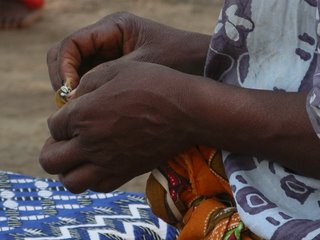
It’s early days and how the situation is resolved exactly remains to be seen, but until then, the man has been told that his official wife and her children must live in the aldeia house with him, and he must find his namorada another house (probably one of the mud houses out in the bairros that usually set up near the aldeias) nearby, if she wants to stay. It was quite clear to me that the wife was not going to fight this woman for the attentions of her husband, but she was going to fight her for the house and the farm and the regular income and the school for her kids… which is everything her husband means to her.
Saturday, November 18, 2006
Posted by
jenglo
at
2:09 pm
![]()
![]()
Subscribe to:
Post Comments (Atom)


1 comment:
Hi Jennifletzet,
Waku-Kungo was once known as Cela and it was (is) a beautiful place. I remember driving by with my parents and observe all those gracious farms. It reminded me of old Europe. As a teenager I remember going to Waku-Kungo with my band to play at the harvest festivities. It was a lot a fun. This was back in early 1970's of course. I heard it's becoming nice again. Let us know a little more about it. Thanks for sharing this little moment with us.
Post a Comment